新概念第一册重点内容演示文稿
合集下载
新概念第一册lesson演示文稿
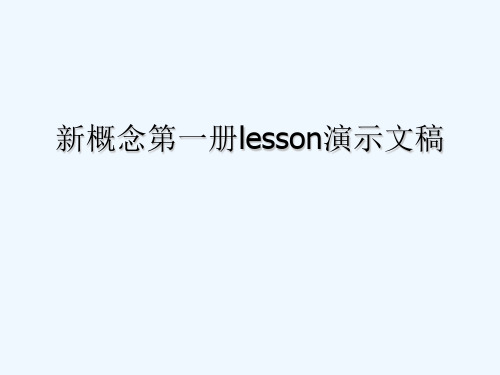
adj. 健康的;晴朗的;优良的
good 可通用,指各种“好”,可与nice 互 换。fine 表示“身体好”时可与well 互换
1. What a fine day!
天气真好!
2. —How are you today?
你好吗?
—I'm fine, thank you.
很好,谢谢。
情景交际:
Nice to see you. HELEN: Nice to see you, too, Steven.
Goodbye.
Unit 5
,
( 3 )how ( 2 )hi ( 4 )today ( 9 ) see ( 7 )thanks ( 1 )hello
( 8 )goodbye ( 6 )fine ( 5 )well
----How are you today? ----I’m very well, thank you. And you? ----I’m fine, thanks.
see v. 见
v. 理解,明白 I see. 我明白了。
see off (到机场 、火车站等)为某人送行
讨论1 look at 与see
是跟不可数名词 how long多长时间 how often表示“经常”,问的是频率 how far表示问距离多远 how soon问“(将来)多久”
How long have you been to China? 你在中国住了多久? How often do you come here to study English? 你多久来这学习英语一次? How soon will you come back? 你将多久回来?
Look at 强调“看”这个动作;see 强调“看”这个结 果。
新概念一册课课件演示文稿

woods clean and tidy.
♪ LWithteerrbeadskidetsthheavwerbiteeerngpolalcaesdtuWndeedrntehsedtareye?s.
♪ LHaest‘sAWanweydoannelesodwtahoyo,fhlreeuabwvbeeisnstlhift,otedrriadinwnt’ahtlekhseien?wthoeodwsoods. ♪ WhYaet sd,ihdehdeidws.eilel baempornogsetchueterdu’.bbish?
Visitors have been asked to keep the woods clean and tidy. Litter baskets have been placed under the trees, but people still throw their rubbish everywhere.
♪ What dHide sthawe saigsingnsaaym?ong the rubbish.
Байду номын сангаас
1
It is a … town.
2
There are many people to…
3
Litter basket is here but…
4
People still throw rubbish….
I live in a very old town (which is surrounded by beautiful woods.)
It’s a famous beauty spot.
➢which 是关系代词,代替town,引导定 语从句
➢is surrounded 是一般现在时被动语态
♪ LWithteerrbeadskidetsthheavwerbiteeerngpolalcaesdtuWndeedrntehsedtareye?s.
♪ LHaest‘sAWanweydoannelesodwtahoyo,fhlreeuabwvbeeisnstlhift,otedrriadinwnt’ahtlekhseien?wthoeodwsoods. ♪ WhYaet sd,ihdehdeidws.eilel baempornogsetchueterdu’.bbish?
Visitors have been asked to keep the woods clean and tidy. Litter baskets have been placed under the trees, but people still throw their rubbish everywhere.
♪ What dHide sthawe saigsingnsaaym?ong the rubbish.
Байду номын сангаас
1
It is a … town.
2
There are many people to…
3
Litter basket is here but…
4
People still throw rubbish….
I live in a very old town (which is surrounded by beautiful woods.)
It’s a famous beauty spot.
➢which 是关系代词,代替town,引导定 语从句
➢is surrounded 是一般现在时被动语态
新概念英语第一册--课课件.演示文稿

together adv. 一起
eg :My best friend and I live together. eg :We sometimes drink coffee together.
第十三页,共29页。
evening n. 晚上
一般指下午以后和上床睡觉前这 段时间比night的时间要早。 night 一般指夜里
warm
South
第三页,共29页。
Which season?
spring
days
long
summer the
nights
the Sun
short
rises early
sets late
第四页,共29页。
autumn
days
short
第五页,共29页。
the
nights --课课件.演 示文稿
第一页,共29页。
(优选)新概念英语第一册--课 课件
第二页,共29页。
where come from
England
North cold
climate?
West
not always
mild pleasant
wet often windy East sometimes
• lunch 午饭
night 夜晚
• afternoon 下午
第十六页,共29页。
Say somAnestwhienrgthaebseouqut eysotuiornfsamily with the help of these questions
• Where are you from? • How many people are
arrive at the hotel
eg :My best friend and I live together. eg :We sometimes drink coffee together.
第十三页,共29页。
evening n. 晚上
一般指下午以后和上床睡觉前这 段时间比night的时间要早。 night 一般指夜里
warm
South
第三页,共29页。
Which season?
spring
days
long
summer the
nights
the Sun
short
rises early
sets late
第四页,共29页。
autumn
days
short
第五页,共29页。
the
nights --课课件.演 示文稿
第一页,共29页。
(优选)新概念英语第一册--课 课件
第二页,共29页。
where come from
England
North cold
climate?
West
not always
mild pleasant
wet often windy East sometimes
• lunch 午饭
night 夜晚
• afternoon 下午
第十六页,共29页。
Say somAnestwhienrgthaebseouqut eysotuiornfsamily with the help of these questions
• Where are you from? • How many people are
arrive at the hotel
新概念英语第一册第课演示文稿

第三十八页,共43页。
How are you?
1.问身体状况
she?
How is
he?
your mum?
How are
Emma?
句型:
you?
How+be动词+主语?
they?
答句:
主语+be动词+fine/well/so so....
第三十九页,共43页。
2.询问某个事物或事情怎么样,如何?
---How is your exam? ---Not too bad.(不太坏)
I’m fine. Thanks.
第十六页,共43页。
How …?的一些社交上的用法: 1、用于询问健康状况或一般生活情况:
How are you? 你好么? 2、How do you do ?是正式介绍中的一句套话,
从不用来询问健康。 3、How经常用在询问目前状况的疑问句里:
How’s life? 生活如何?
回答:I'm+国籍人.
• 问职业
What's your job? What are you?/is she?/is he? 回答:I'm/She is/He is+职业.
第四页,共43页。
what's your feeling now?
第五页,共43页。
第六页,共43页。
Part 2
Words
She is ugly.
第三十四页,共43页。
Look at it.
How is the room?
The room is clean.
It is clean.
第三十五页,共43页。
Look at it.
How are you?
1.问身体状况
she?
How is
he?
your mum?
How are
Emma?
句型:
you?
How+be动词+主语?
they?
答句:
主语+be动词+fine/well/so so....
第三十九页,共43页。
2.询问某个事物或事情怎么样,如何?
---How is your exam? ---Not too bad.(不太坏)
I’m fine. Thanks.
第十六页,共43页。
How …?的一些社交上的用法: 1、用于询问健康状况或一般生活情况:
How are you? 你好么? 2、How do you do ?是正式介绍中的一句套话,
从不用来询问健康。 3、How经常用在询问目前状况的疑问句里:
How’s life? 生活如何?
回答:I'm+国籍人.
• 问职业
What's your job? What are you?/is she?/is he? 回答:I'm/She is/He is+职业.
第四页,共43页。
what's your feeling now?
第五页,共43页。
第六页,共43页。
Part 2
Words
She is ugly.
第三十四页,共43页。
Look at it.
How is the room?
The room is clean.
It is clean.
第三十五页,共43页。
Look at it.
新概念第一册Lesson课件演示文稿

2022/2/17
第24页,共45页。
2.know …well
对……了解
I don’t know him very well.
我对他不是很了解。
3.and 此处指的是“因此,所以”相当于so. Come upstairs and see it.
第25页,共45页。
4.lose one‘s way 迷路
第34页,共45页。
Lesson 74
What did they do? 他们干了什么?
2022/2/17
第35页,共45页。
1.不规则动词的过去式
• cut • do • drink • find • give • go • lose
• cut • did • drank • found
• gave
第18页,共45页。
'Excuse me,' she said.
'Can you tell me the way to King Street, please?‘
第19页,共45页。
The man smiled pleasantly.
He did not understand English! He spoke German.
It's very easy to lose your way in a strange city. 在一个陌生的城市里,你很容易迷路。
2022/2/17
第26页,共45页。
5. see的过去式是 saw
• see:看见,强调结果 • see sth. • look:看,强调动作 • look at sth.
8. tell sb. sth. 告诉某人某事
tell的过去式是told
第24页,共45页。
2.know …well
对……了解
I don’t know him very well.
我对他不是很了解。
3.and 此处指的是“因此,所以”相当于so. Come upstairs and see it.
第25页,共45页。
4.lose one‘s way 迷路
第34页,共45页。
Lesson 74
What did they do? 他们干了什么?
2022/2/17
第35页,共45页。
1.不规则动词的过去式
• cut • do • drink • find • give • go • lose
• cut • did • drank • found
• gave
第18页,共45页。
'Excuse me,' she said.
'Can you tell me the way to King Street, please?‘
第19页,共45页。
The man smiled pleasantly.
He did not understand English! He spoke German.
It's very easy to lose your way in a strange city. 在一个陌生的城市里,你很容易迷路。
2022/2/17
第26页,共45页。
5. see的过去式是 saw
• see:看见,强调结果 • see sth. • look:看,强调动作 • look at sth.
8. tell sb. sth. 告诉某人某事
tell的过去式是told
新概念英语第一册课和课演示文稿
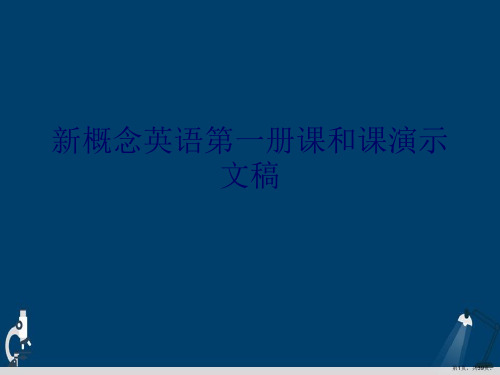
July、August、September、October 、November、 December
第3页,共39页。
Review
3. 询问来自哪个国家?(两种问法) Where do you come from?=Where are you from?
I come from China. = I am from China. 4. 询问是哪个国家的人? What nationality are you?
9:00 Mr.
reads his newspaper reading an
Sawyer
interesting book
第10页,共39页。
1. It is eight o'clock. The children go to school by car every day, but today, they are going to school on foot.
live + at + ? arrive +at + ?
第6页,共39页。
Review
9. 一般现在时的用法: 当主语是第三人称时,它的构成是:? 主语 + 频率副词 + 三单 + 其他 当主语不是第三人称时,它的构成是:? 主语 + 频率副词 + 动词原形 + 其他 10. 频率副词有哪些?
unusually [ʌn'ju:ʒuəlɪ]
adv. 非常;异乎寻常地;显著地
( un 否定前缀) usually adv.通常
第9页,共39页。
usually
today
8:00 childre go to school by car going to school
第3页,共39页。
Review
3. 询问来自哪个国家?(两种问法) Where do you come from?=Where are you from?
I come from China. = I am from China. 4. 询问是哪个国家的人? What nationality are you?
9:00 Mr.
reads his newspaper reading an
Sawyer
interesting book
第10页,共39页。
1. It is eight o'clock. The children go to school by car every day, but today, they are going to school on foot.
live + at + ? arrive +at + ?
第6页,共39页。
Review
9. 一般现在时的用法: 当主语是第三人称时,它的构成是:? 主语 + 频率副词 + 三单 + 其他 当主语不是第三人称时,它的构成是:? 主语 + 频率副词 + 动词原形 + 其他 10. 频率副词有哪些?
unusually [ʌn'ju:ʒuəlɪ]
adv. 非常;异乎寻常地;显著地
( un 否定前缀) usually adv.通常
第9页,共39页。
usually
today
8:00 childre go to school by car going to school
新概念英语第一册课课演示文稿
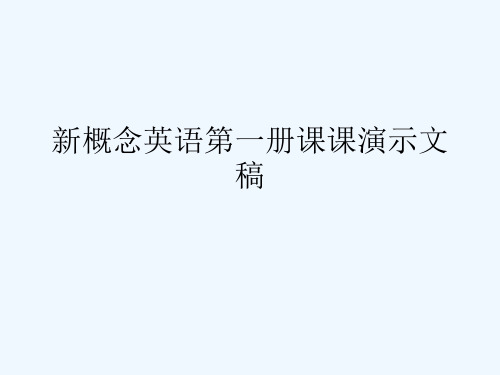
hear?
ourselves, Mum.
J: Yes, Dad.
Bye-bye.
• Enjoy yourself!=Have a good time. (1)在enjoy这个动词后面往往有一个反身
代词,如yourself, myself, herself, himself, ourselves.
(2)enjoy后跟V+ing,表示喜欢做某事,如 enjoy swimming, enjoy singing.
She always comes home early. I always have eggs and milk for breakfast. Tom is always late for school. Mary is always ready to help others.
The important points
Listen again then answer these questions. 4. Does her father want to give her the key?
No, he doesn’t. 5.When must Jill get home? She must get home before a quarter past eleven. 6. Do she and her friends always enjoy themselves? Yes, they do.
• That's all right.=You are welcome.
The important points
oneself(反身代词)
• I—myself • you—yourself/yourselves • it--itself • she—herself • he—himself • we—ourselves • they--themselves
新概念英语第一册第课演示文稿
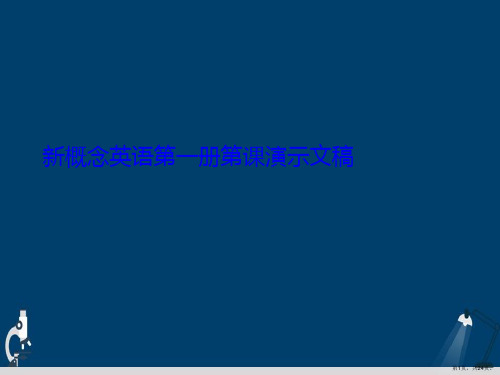
This is not my umbrella. (否定句)is not=isn’t 2. I’m a student. (肯定句)
I’m not a student. (否定句)
I’m=I am am和not不能缩写 3. You are a teacher. (肯定句)
You are not a teacher. (否定句) are not=aren’t 注意:I’m,he’s,she’s,we’re,they’re,it’s,you’re只能
This is not my ........这不是我的......
• 缩写形式:常将be动词与not或其他词连写在 一起。
• Here is = Here's • is not—isn’t • are not—aren’t
第21页,共24页。
Sentence patterns 句型
Is this your…? No, it isn’t. This is not (isn’t) my…
Sorry sir.
Is this your umbrella? No, it isn't.
Is this it? Yes, it is.
Thank you very much.
第9页,共24页。
My coat and my umbrella please.
第10页,共24页。
Here is my ticket.
新概念英语第一册第课演示文稿
第1页,共24页。
(优选)新概念英语第一册第课ppt讲解
第2页,共24页。
New words and expressions
• umbrella [ʌm‘brelə] n.伞 • please [pliːz] int. 请 • here [hɪə] adv. 这里 同音词:hear(听见) • my [maɪ] possessive adjective 我的 对应词:your • ticket [‘tɪkɪt] n. 票 • number [‘nʌmbə] n. 号码=No. • five [faɪv] num. 五 • sorry [‘sɒrɪ] adj. 对不起的 • sir [sɜː] n. 先生 • cloakroom [‘kləʊkrʊm] n. 衣帽存放处
I’m not a student. (否定句)
I’m=I am am和not不能缩写 3. You are a teacher. (肯定句)
You are not a teacher. (否定句) are not=aren’t 注意:I’m,he’s,she’s,we’re,they’re,it’s,you’re只能
This is not my ........这不是我的......
• 缩写形式:常将be动词与not或其他词连写在 一起。
• Here is = Here's • is not—isn’t • are not—aren’t
第21页,共24页。
Sentence patterns 句型
Is this your…? No, it isn’t. This is not (isn’t) my…
Sorry sir.
Is this your umbrella? No, it isn't.
Is this it? Yes, it is.
Thank you very much.
第9页,共24页。
My coat and my umbrella please.
第10页,共24页。
Here is my ticket.
新概念英语第一册第课演示文稿
第1页,共24页。
(优选)新概念英语第一册第课ppt讲解
第2页,共24页。
New words and expressions
• umbrella [ʌm‘brelə] n.伞 • please [pliːz] int. 请 • here [hɪə] adv. 这里 同音词:hear(听见) • my [maɪ] possessive adjective 我的 对应词:your • ticket [‘tɪkɪt] n. 票 • number [‘nʌmbə] n. 号码=No. • five [faɪv] num. 五 • sorry [‘sɒrɪ] adj. 对不起的 • sir [sɜː] n. 先生 • cloakroom [‘kləʊkrʊm] n. 衣帽存放处
新概念第一册课课件演示文稿
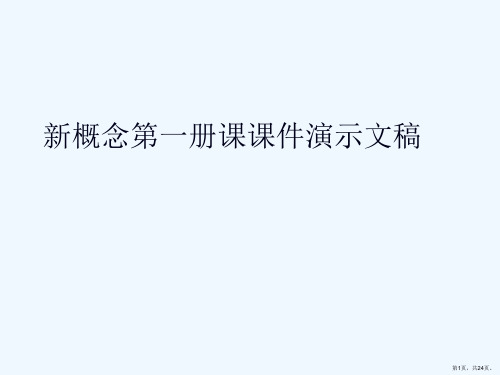
第20页,共24页。
第21页,共24页。
特殊疑问句:对地点状语进行提问
对句中地点状语提问,地点状语用where代替, 后面采用一般疑问句的结构。
The students are playing on the playground. Where are the students playing?
第19页,共24页。
1. This is a photograph of our village.
a photograph of our village 名词所有格词组 the legs of the chair the windows of the room the banks of the river
新概念第一册课课件演示文稿
第1页,共24页。
Warm up
第2页,共24页。
第3页,共24页。
between
在..之间
公车穿梭在两个城市之间
Buses go between the two cities.
第4页,共24页。
photograph
相片photo take a photo 照张相
His house stands near the river. Where does his house stands?
第22页,共24页。
Lesson 36 Where...?
第23页,共24页。
key sentences
Where is the man going?
He is going into the shop.
广州建立在珠江河畔。
GZ is built on the Pearl River. near 靠近 我住在海边。
I live near the sea.
第21页,共24页。
特殊疑问句:对地点状语进行提问
对句中地点状语提问,地点状语用where代替, 后面采用一般疑问句的结构。
The students are playing on the playground. Where are the students playing?
第19页,共24页。
1. This is a photograph of our village.
a photograph of our village 名词所有格词组 the legs of the chair the windows of the room the banks of the river
新概念第一册课课件演示文稿
第1页,共24页。
Warm up
第2页,共24页。
第3页,共24页。
between
在..之间
公车穿梭在两个城市之间
Buses go between the two cities.
第4页,共24页。
photograph
相片photo take a photo 照张相
His house stands near the river. Where does his house stands?
第22页,共24页。
Lesson 36 Where...?
第23页,共24页。
key sentences
Where is the man going?
He is going into the shop.
广州建立在珠江河畔。
GZ is built on the Pearl River. near 靠近 我住在海边。
I live near the sea.
新概念英语第一册课件演示文稿
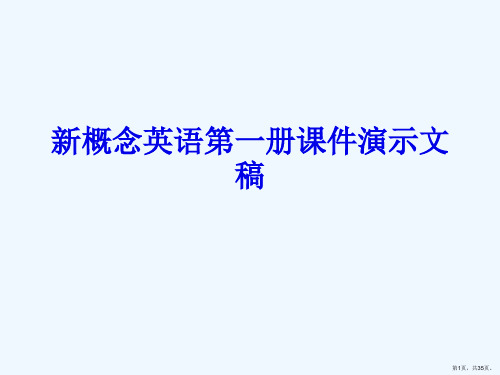
• 安静的房间 • a quiet room
第10页,共35页。
• impossible adj. 不可能的,办不到的 • 反义词:possible
• It is impossible for sb to do… 做….是不可能的 • 在这样的下雨天是不可能搭到出租车的。 • It is impossible to get a taxi on such a rainy day.
第25页,共35页。
• Thanks, Carol. May I have a glass of beer please? There’s none left. You can have some lemonade.
• May I…? 我能……? • 我可以看一下你的书吗? • May I have a look at your book? • 我可以问你一个问题吗? • May I ask you a question? • none 表示“没有任何东西”,是代词。 • there’s none 表示“什么也没有” • left 是过去分词,表示“剩下的”,修饰none.
数形式。 • 你有没有什么吃的? • Do you have anything to eat? • 她对烹饪一窍不通。 • She doesn’t know anything about cooking.
第22页,共35页。
• Nothing at all. • Nothing是不定代词,作主语时,后面的谓语
• I’ll knock again, Helen. Everything’s very quiet. • 1)everything 也是不定代词 • 2)表示一切事物 • 3)everything 作主语,谓语动词用单数形式。
第10页,共35页。
• impossible adj. 不可能的,办不到的 • 反义词:possible
• It is impossible for sb to do… 做….是不可能的 • 在这样的下雨天是不可能搭到出租车的。 • It is impossible to get a taxi on such a rainy day.
第25页,共35页。
• Thanks, Carol. May I have a glass of beer please? There’s none left. You can have some lemonade.
• May I…? 我能……? • 我可以看一下你的书吗? • May I have a look at your book? • 我可以问你一个问题吗? • May I ask you a question? • none 表示“没有任何东西”,是代词。 • there’s none 表示“什么也没有” • left 是过去分词,表示“剩下的”,修饰none.
数形式。 • 你有没有什么吃的? • Do you have anything to eat? • 她对烹饪一窍不通。 • She doesn’t know anything about cooking.
第22页,共35页。
• Nothing at all. • Nothing是不定代词,作主语时,后面的谓语
• I’ll knock again, Helen. Everything’s very quiet. • 1)everything 也是不定代词 • 2)表示一切事物 • 3)everything 作主语,谓语动词用单数形式。
相关主题
- 1、下载文档前请自行甄别文档内容的完整性,平台不提供额外的编辑、内容补充、找答案等附加服务。
- 2、"仅部分预览"的文档,不可在线预览部分如存在完整性等问题,可反馈申请退款(可完整预览的文档不适用该条件!)。
- 3、如文档侵犯您的权益,请联系客服反馈,我们会尽快为您处理(人工客服工作时间:9:00-18:30)。
China Chinese
北京: Beijing
France French
France 法国 French 法国(语)的
Paris 巴黎
Korea
Korean
Korea 韩国 Korean 韩国人(语)的
首尔 : Seoul
Germany German
柏林: Berlin
Chinese 中国的;中国人
A. you B. me C. it D. I
2. --Is this your umbrella? -- No, it D____ .
A. is B. not is C. my D. isn’t
3. – What is your name? –Pardon? --_A____
A. What is your name?
再见 晚安 good bye 祝你好运good night
good luck
课文讲解
• Mr. 先生
Mr.用于男士的姓之前,不能单独使用,如课文 中的 Mr.Blake;而sir 一般单独使用,是对长 者、上司或男顾客的尊称,如:Sorry, sir. 对不 起,先生。
• Miss 小姐 一般用于指未婚女子,不过有时在不知道 对方是否已婚时也可使用
Do you like these clothes?
Is this building beautiful?
Shall we go boating tomorrow?
不定冠词a
• 冠词数量上表示“一个”。冠词一共有 三个,分为不定冠词(a,an)和定冠 词(the)。
• 可数名词单数前面必须要用不定冠词。 a用在以辅音音素开头的名词前面 an 用于以元音开头的名词前面 例如:a pen an apple an umbrella an egg an hour a shirt
review
• umbrella n.
• please
int.
• here adv.
• ticket
n.
• number
n.
• sorry
adj
• sir
n.
cloakroom n.
•伞 •请 • 这里 •票 • 号码 • 对不起的 • 先生 • 衣帽间
练一练
1. Excuse B____ ! Is this your hamdbag?
• Korean adj.&n. 韩国人
• Chinese adj&n. 中国人
• too
adv.
也
country
国家
nationality 国籍
capital
首都
What nationality are you? I am a Chinese. Where are you from?
I am from China. I am a Chinese.
Good morning !
Good morning , Mr. Blake .
This is Miss Sophie Dupont .
Sophie is a new _s_tu_d_e_n_t_ . _S_h_e__is French
Sophie , this is Hans . He is German.
Are they lovely?
Would you like to play with the cat?
Do you like sitting on this chair?
Can you tell me the story? Try you best!
三. Text Appreciation:
And this is Luming.
He’s _C_h__in_e__s_e_ .
“Nice to meet you .”
And this is Xiaohui . She’s Chinese ,
______. too
“Nice to meet you .”
课文讲解
• Good morning. 早上好 那么下午好和晚上好还记得怎么说吗? Good afternoon. Good evening.
见到你很高兴!
Nice to meet you .
And _th__is__is__Naoko.
She is Japanese. “N__ic_e__to__m_e_e_t__y_o_u .”
And this is Chang-woo. He’s __K_o_r_e_a_n_.
“ N__ic_e__to__m__e_e_t _y_o-u.”
French 法国的;法国人
German 德国的;德国人
Japanese 日本的;日本人
Korean 韩国的,韩国人
Swedish 瑞典的;瑞典人
English 英国的;英国人
American 美国的;美国人
Italian 意大利的;意大利人
如何询问国籍呢?
• What nationality is she /he ? • She’s French/Chinese/German/Korean • He’s …. • What is your nationality ? • I am American / Italian / English .
word study
• Mr.
先生
• Miss
小姐
• good adj.
好
• morning
n. 早晨
• new
adj. 新的
• student n.
学生
• French adj.&n. 法国人
• German adj.&n. 德国人
• nice
adj.
Байду номын сангаас
美好的
• meet
v.
遇见
• Japanese adj.&n. 日本人
B. Is this your hamdbag?
C. Thank you very much!
D. Nice to meet you.
一. Listen to the tape ,then answer this question “Is Chang-woo Chinese?”
二. New words and expressions About nationality 关于国籍
新概念第一册重点内容演示文 稿
What is your favourite animal?
Lesson 5
Nice to meet you.
review
• 这是我的...... Here's my...
• 这个不是我的...... This is not my...
• 号码的表达方法 Number...
